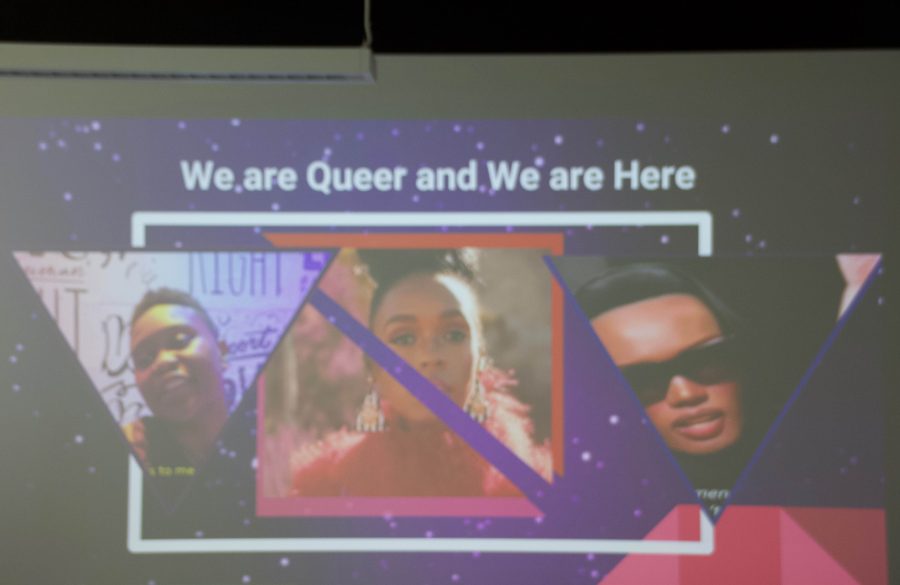Feb. 28, 2019—The Queer Student Center, more commonly known as “The Q,” matched up with Casa Latinx, the Asian Student Center (ASC), and the Black Student Center (BSC) to celebrate their second installment of “Queer X Color.” While the first event happened Tuesday, Feb. 26, this event was to celebrate the lives and legacies of LGBTQ+ activists in the United States. All the tables were covered in most of the LGBTQ+ flags: pansexual, gay, asexual, transgender, etc. Starting at 6:30 p.m. in Ballroom C of the Campus Center, it was a slow start but there were around 20 attendees by the middle of the event.
The Q Coordinator, started the event with an introduction asking the group what it means for them to be queer and a person of color (POC) in the United States. As they passed the microphone around one student said, “Double minority.” When the mic got passed to the second person, they stated, “A lot of times it can mean having a found family or a chosen family. I figure like racial community and the queer community isn’t fully accepting of you; so you kind of have to find people that love you and love you for your whole self.”
After the coordinator’s introduction, Jonathan McDavell-Daniels took the stage and reiterated what the majority was saying with his own twist and as a queer POC. He said: “It’s important for me to relay that we all belong. We all have a place—one with one another. And the only way we can get through this is by joining together.” His speech went straight into the Stonewall Riots and the importance of activists such as Marsha P. Johnson; the queen threw the first “stone” at the Stonewall Inn back in 1969. The Stonewall Riots were a turning point in the civil rights movement for LGBTQ+ people. Later on, they showed different clips from the gay civil rights marches; one video showed Sylvia Rivera giving a speech during a rally. Sylvia Rivera, a Latinx drag queen, is one of the main activists from the 1970s and helped form S.T.A.R. (Street Transvestite Action Revolutionaries) with Johnson.
McDavell-Daniels then took his seat; the coordinator continued the slides and told the audience about Bayard Rustin, Martin Luther King Jr.’s openly gay personal advisor. With white supremacy groups threatening to fake a sex scandal between King and Rustin, they both believed it would better for him to organize from afar. Rustin was a huge part in the scheduling and planning of the 1963 March on Washington.
Q member Miren Parkinson was also part of the rotation; her portion of the slideshow was a focus on queer influences and people in the media and pop culture today. Parkinson showed clips of different musicians such as Kevin Abstract from Brockhampton and Janelle Monáe. The clips were from “Junky” by Brockhampton and “Make Me Feel” by Janelle Monáe. Parkinson also mentioned non-binary actor, Amandla Stenberg, who played Rue in The Hunger Games (2012).
A member of The Q was introduced and came up to the front podium to talk about the small vs. large scale of the dangers queer POC have to go through. They told the audience about erasure, violence, and poverty many face—especially black trans-women. Their clip was about Johanna, a transgender woman who was detained by ICE while trying to cross the border to seek asylum. Johanna went through a terrible time but is now a free woman, trying to advocate for her community.
Finally, the coordinator went back up and went over statistics of what LGBTQ+ students go through in school. Ninety-eight point one percent have heard “gay” used negatively, and 58 percent of students feel unsafe. McDavell-Daniels went up one more time and performed a dance to “Face My Fears” by Utada Hikaru & Skrillex. Afterwards there was a raffle, and the coordinator wanted all to mingle and for everyone get to know each other.
The coordinator definitely saw Queer X Color as a success, stating: “I did find the event a success, despite the fact it’s not like a hundred people inside of the room; it’s still enough people there for a reason. They were there because they wanted to gain support from their community; they want to learn more about issues that affect them, and they want to feel love and support of a campus community.” She found that smaller events make a space feel more inclusive for networking and meeting newcomers.
Queer X Color
By Claire Speredelozzi
|
March 2, 2019

